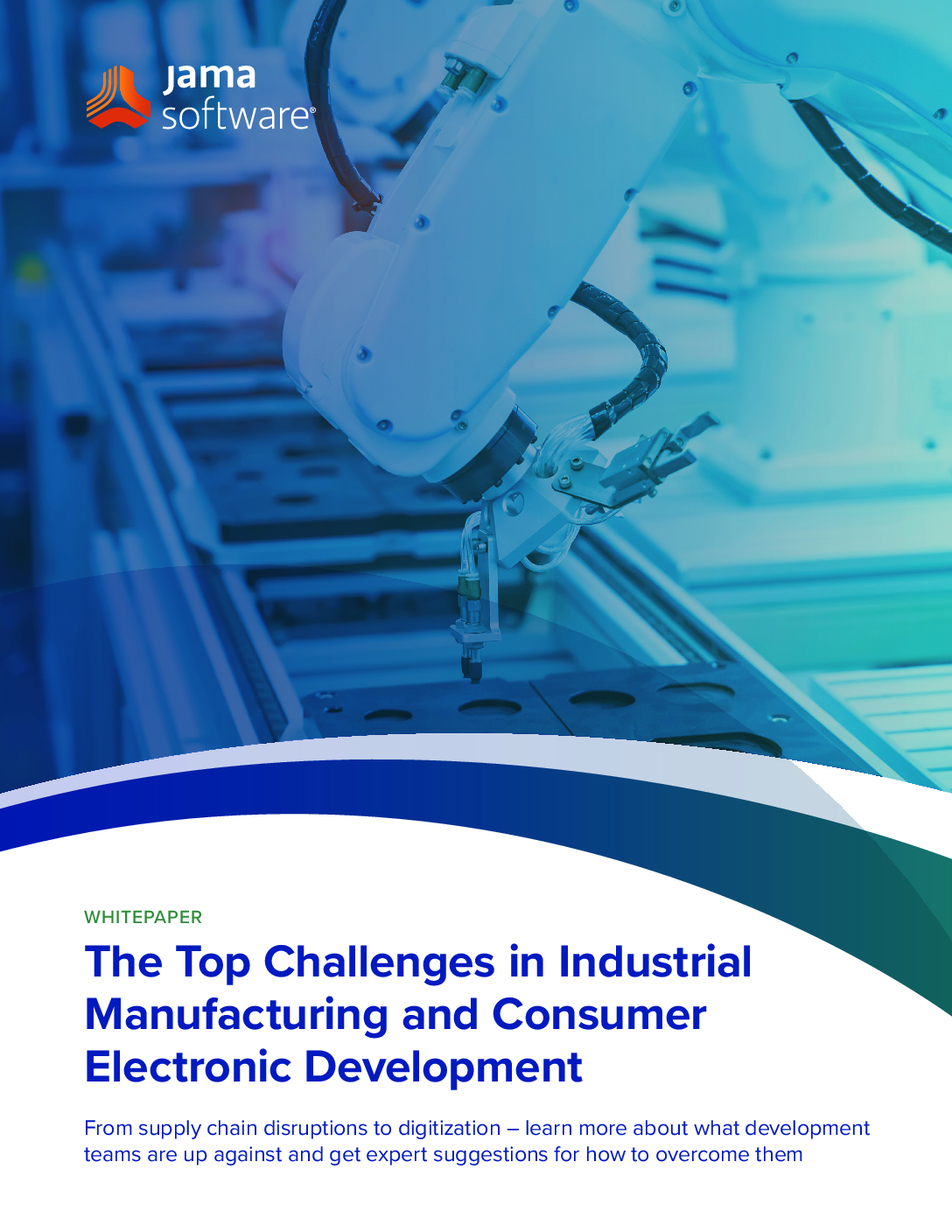
The Top Challenges in Industrial Manufacturing and Consumer Electronic Development
Industrial manufacturing has always been a cornerstone of economic growth and development worldwide. Over the last few years (or more), the industrial manufacturing sector has undergone significant transformation; from the introduction of automation and robotics to advanced analytics. Today, industrial manufacturers are facing a host of new challenges that are forcing teams to rethink their strategies and adapt to changing market influences and demands.
Read this whitepaper to learn:
- Some of the challenges industrial manufacturing teams are up against
- Expert insights and strategies on how to work through them
- How modern requirements management solutions can help
The whitepaper examines the significant obstacles currently facing industrial manufacturing and consumer electronics sectors, along with strategies to overcome them. It highlights the impact of modern challenges such as supply chain disruptions, environmental sustainability, the need for automation and digitalization, talent shortages, and economic uncertainty. These challenges demand that development teams adapt quickly, leveraging advanced technologies and strategic approaches to maintain competitiveness and operational efficiency.
- Supply Chain Disruptions remain one of the most complex issues for manufacturers, particularly due to the ongoing effects of the COVID-19 pandemic, trade conflicts, and tariffs. Engineers are integral in mitigating these risks by enhancing supply chain resilience through advanced supply chain management strategies and adopting new technologies.
- Environmental Sustainability has become a priority for manufacturers as consumer demand for eco-friendly products grows. This shift includes reducing carbon emissions, minimizing waste, and switching to renewable energy sources. Emphasizing sustainable practices not only benefits the environment but can also enhance brand reputation, reduce resource consumption, and attract eco-conscious consumers. Many companies are now adopting technologies like the Internet of Things (IoT) and AI to optimize sustainable production.
- Automation and Digitalization are transforming manufacturing by integrating robotics, digital twins, predictive maintenance, and IoT. While automation promises reduced labor costs, enhanced product quality, and operational efficiency, it also requires investment in technology and training for the workforce. These digital tools, from predictive maintenance to digital twins, allow manufacturers to proactively address production issues, improve productivity, and streamline operations.
- A Talent Shortage in fields such as engineering, data analytics, and computer science further challenges the industry. This issue has worsened due to an aging workforce and changing career preferences among younger generations. Manufacturers are responding by offering training and upskilling programs, competitive benefits, and partnerships with educational institutions to attract new talent and retain skilled workers.
- Economic Uncertainty impacts product demand, supply chain operations, and investment in new technologies. Fluctuations in the economy influence consumer spending and force manufacturers to be cautious with investments in new technologies and procedures. Manufacturers are
countering this by diversifying supply chains, investing in adaptive technologies, and making operations more agile to quickly respond to market changes.
In response to these challenges, Jama Software® offers the tools and expertise that support development teams in navigating industrial complexities. Jama Connect®, a requirements management platform, helps teams improve requirements quality, ensuring that products meet safety and regulatory standards while minimizing risks of project failure. This platform provides automated requirements quality checks, Live Traceability™, and enhanced collaboration capabilities, all crucial for managing the complexity of modern product development cycles.
In conclusion, the whitepaper emphasizes that adapting to industry challenges requires embracing cutting-edge technologies, sustainability, and agility. With platforms like Jama Connect, manufacturers can streamline compliance processes, improve product safety, and maintain competitive advantage in an increasingly dynamic and demanding market.